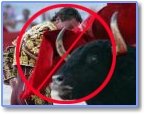 |
The World is Awakening
to the Noble Lifestyle
By the Florida News Group, USA (Originally in English)
Radical
new animal law enacted in Europe
![]()
![]()
![]()
![]()
![]()
![]()
 On
January 23, 2006, the EU Parliament enacted a comprehensive overhaul
of its animal welfare law that reflects a rising awareness of animal
rights in Europe. Through the new legislation, many cruel animal farming
practices, such as battery cages and crates, will be phased out over
the next five to ten years. The law also details standard animal housing
with respect to size, surface area and lighting.
On
January 23, 2006, the EU Parliament enacted a comprehensive overhaul
of its animal welfare law that reflects a rising awareness of animal
rights in Europe. Through the new legislation, many cruel animal farming
practices, such as battery cages and crates, will be phased out over
the next five to ten years. The law also details standard animal housing
with respect to size, surface area and lighting.
The noble sentiments of Europeans
Also, in early 2005 a new label certification system for humane animal products began from the historic Eurobarometer Surveys on Attitudes of Europeans distributed to 70,000 EU citizens. The survey showed that a vast majority of Europeans demanded better labeling for animal products, and almost 60% said they were willing to pay more for animal welfare-friendly foods. Regarding the survey, EU Commissioner Markos Kyprianou commented, “European consumers clearly care about animal welfare and want to make informed purchasing choices.” The Surveys report concluded, “There has been a clear shift of public attitudes towards animals over recent decades and how animals are considered in society."
Following this assessment, the majority of EU citizens urged the government to promote animal welfare worldwide. As a result, the first-ever detailed international guidelines on farm animal welfare were proposed at the OIE, the World Organization for Animal Health, and soon adopted by the group's 167 member countries in May 2005.1
Also, in February 2006, the UK Parliament enacted an Animal Welfare Bill, which marks a fundamental change in animal law in the UK by placing legal liability on animal owners to respect an inherent right to proper treatment of their animals. The law is backed by fines of up to US$35,000 and one year in jail.2
Glorious changes in China
![]()
![]()
![]()
![]()
In October, 2004, Beijing proposed a mandate that farm animals be killed with as little pain as possible. Regarding this law Dr Peter Li of the University of Houston said, "Never before in China have questions regarding the treatment of animals attracted so much attention. Since the late ‘90s, Chinese scholars have by their own initiative been engaged in heated discussion, and recent high profile animal cruelty cases have helped turn this into a subject of public discussion." Since it possesses the world’s largest population, China’s animal welfare reforms represent an extremely significant development in improving the plight of animals.
The precious heritage of India
![]()
![]()
![]()
![]()
India has an ancient heritage of respecting animals which continues to the present day. For instance, a provision in the Indian constitution states that Indians have a moral obligation to prevent animal suffering3 and on March 11, 2004, the Indian Supreme Court upheld a strict law in the pilgrim town of Rishikesh preventing the sale of eggs. Responding to local meat-sellers who argued that the law was against modern democracy, the Court simply said, “It is a matter of common knowledge that members of several communities in India are strictly vegetarians and shun meat, fish and eggs.”
India is currently run by the Congress Party with both the Prime Minister and President advocating the vegetarian diet. So on January 21, 2006, the Congress Party convention opened with a vegetarian meal for over three thousand delegates.
In the past, disputes in India over the killing of cows and pigs led to many deadly clashes between the Hindu and Muslim communities. However, in 2004, a rule issued by a leading Muslim council in Delhi has brought greater peace. The rule requires Indian Muslims not to slaughter cows during certain Hindu holidays.4
New movement in the Netherlands
![]()
![]()
![]()
A political party devoted entirely to animals has been founded in the Netherlands. “The Party for the Animals” has won the affection of millions of Dutch citizens and nearly won a seat in the European Parliament in 2004.5
Historic event in Spain
![]()
![]()
![]()
![]()

The City of Barcelona made history in 2004 by declaring itself opposed to its cruel ancient sport of bullfighting. The sport was banned throughout Catalonia in 2005.
Wise laws from Rome
![]()
![]()
![]()
![]()
In October 2005, the city of Rome, Italy, enacted the most comprehensive pet laws ever passed in any country. The city requires pet owners to walk their dogs once a day (or risk a US$625 fine), outlaws many insensitive practices and even bans construction in 800 areas containing wild cat colonies. Also, all Roman animal shelters are no-kill. The city counselor behind the Roman law said, "It's good to do whatever we can for our animals who in exchange for a little love fill our existence with their attention. The civilization of a city can also be measured by this."
Awakening in America
![]()
![]()
![]()
![]()
Although the US ranks second among nations in meat consumption, profound changes are occurring in Americans' relationship with animals. For example, in November 2002 the citizens of Florida took the unprecedented step of entering an amendment into their State Constitution to improve the welfare of pregnant pigs. This amazing act of conscience led to the passage of many other animal welfare laws by popular vote. In 2006 votes will be held on managing pig and veal pens in Arizona and on banning dog racing in Massachusetts, following eight other states.
And in January 2006, the city of Bloomington, Indiana changed the word "owner" to "guardian" in its municipal animal laws. Bloomington is the 14th US city to make this change, along with the entire State of Rhode Island, reflecting a major trend toward giving animals some of the basic legal rights previously held only by human beings. "Pet trusts" have also emerged as a new legal development in the US. Just like trusts for children, these funds are set aside for animals when their owners die. Gerry Beyer, a law professor who specializes in this area, says, "The idea [of pet trusts] has gone from something that seems laughable to something that's very mainstream, almost overnight."
True progress in science
![]()
![]()
![]()
![]()
Animal rights in scientific experimentation have become a major topic of discussion across Europe. The new EU animal law requires nations to pursue alternatives to animal testing, based on the “3Rs” principle (replacement, reduction and refinement of the use of animals in experiments). The US Congress has recently funded a similar initiative to develop alternatives. In 2005, the New Jersey legislature voted unanimously to prohibit animal tests if such federal alternatives exist. Computer models and videos can now replace dissections in science classes, and in 2005 the Toronto school board announced a “dissection choice” policy, which requires that all students be informed that they have a right not to perform dissections and to be provided with other options.
Colleges become green
![]()
![]()
![]()
![]()
In recent years, vegetarian meal options have become available in schools and colleges across the US as parents and students demand fruits, vegetables and meat substitutes being served in their cafeterias.
In Miami, Florida, in 2001, Dr. Antonia Demas taught a class of 19 juvenile offenders how to make vegetarian food, insisting that they all keep a pure vegetarian diet and drink eight glasses of water a day for three weeks. All of the boys showed improvement with respect to aggressive behavior, academic and athletic performance and strength and a 30% drop in risk factors for future heart disease. After publishing her results, Dr. Demas was invited to bring her technique to schools in five other states.6
In 2003, Dr. Robert Lawrence, associate dean of the Bloomberg School of Public Health at Johns Hopkins University and winner of the 2002 Albert Schweitzer Prize for Humanitarianism, began a campaign called “Meatless Mondays” to promote vegetarianism at his school, which is frequently ranked #1 among health schools in the US. Over the last thirty years, the number of articles in scientific journals about vegetarianism has increased almost eight times, and in 1997 the American Dietetic Association released a position paper strongly supportive of vegetarianism.7
Food of the future
![]()
![]()
![]()
![]()
![]()
![]()
![]()
 NASA
has also successfully developed pure vegetarian space food. One project
in 2000 determined 100 primarily vegetarian recipes using crops raised
in a bio-regenerative life support system, in which plants and microorganisms
regenerate air, water and food for the crew. NASA tested the vegetarian
recipes in a thirty-day study and concluded that people living in space
will be perfectly happy eating vegetarian food.
NASA
has also successfully developed pure vegetarian space food. One project
in 2000 determined 100 primarily vegetarian recipes using crops raised
in a bio-regenerative life support system, in which plants and microorganisms
regenerate air, water and food for the crew. NASA tested the vegetarian
recipes in a thirty-day study and concluded that people living in space
will be perfectly happy eating vegetarian food.
 Since
the Mad Cow epidemic and other recent global health concerns emerged,
consumers have shown that they are willing to pay more for ingredients
that are labeled vegetarian or are from a vegetable source. A food market
analysis in January 2006 stated that 30-50% of animal-based ingredients
will be replaced by vegetarian versions within five to ten years.8
Since
the Mad Cow epidemic and other recent global health concerns emerged,
consumers have shown that they are willing to pay more for ingredients
that are labeled vegetarian or are from a vegetable source. A food market
analysis in January 2006 stated that 30-50% of animal-based ingredients
will be replaced by vegetarian versions within five to ten years.8
![]()
References:
1 http://europa.eu.int/comm/food/animal/welfare/index_en.htm
2 http://europa.eu.int/comm/food/animal/welfare/index_en.htm
3 Article 51-A
4 http://www.hindu.com/2004/02/02/stories/2004020204261100.htm
5 http://www.partijvoordedieren.nl
6 http://www.foodstudies.org
7 15. Sabate J, Duk A, Lee CL. Publication trends of vegetarian nutrition
articles in biomedical literature; 1966-1995. Am J Clin Nutr 1999;70(suppl):601S-607S.
8 http://www.foodnavigator-usa.com/news/ng.asp?n=65085-dsm-vegetarian-food-safety-
Refer
this page to friends |
||
Enlightened Leadership Creating a Bright Future
Canada | Australia | Costa Rica | New Zealand | Slovenia |The Netherlands | USA